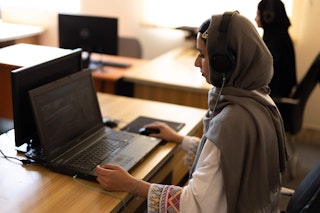“Many times, when I write about a woman’s life, tears roll down my cheeks”
Mahrosa
“My name is Mahrosa, and I graduated from the Journalism Faculty at Kabul University. I have been working as a journalist in Badakhshan for six years now. I started my media career with the Nihad Radio and Paykan Television during my first semester at university. Throughout these six years, I have worked with various media outlets in Badakhshan.
All the pain, suffering and challenges that my mother and women like her have faced motivated me to become a journalist to be the voice for these suffering women. On 15 August, when the Taliban took control, I lost my job with a local radio station. Our media outlet was shut down and never became active again. I did not apply to other national or local media outlets because the Taliban imposed various restrictions on local or national media, and all media content is monitored and published under the supervision of the provincial Information and Culture Directorate. No media are allowed to publish content against the will of this group.
I did not want to work for media under the control of the Taliban. Journalists cannot adhere to journalistic principles, where impartiality is the most crucial principle, under the Taliban’s rule. That’s why I withdrew from domestic media and joined an international media outlet that operates outside Afghanistan and works for Afghan women and girls. However, working with a foreign media outlet and preparing reports against the Taliban’s will is very challenging.
These challenges clouded my mind, but I looked myself in the mirror, staring into my own eyes, and told myself, with strength: ‘Mahrosa, you are an Afghan girl. From the moment you could recognize your right and left hand, you have faced complete family violence. When you entered society, violence increased. Tell yourself, Mahrosa, you can fight and never surrender. You must be the voice of the suffering women in your homeland’.”
